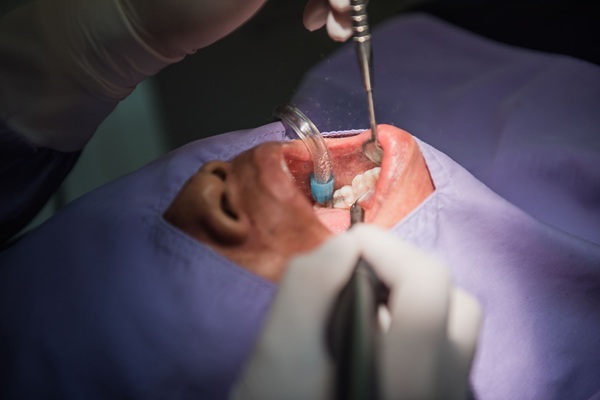How Gum Disease Treatment Restores Oral Health and Confidence

Gum disease is a common yet serious oral health issue that can cause discomfort, damage, and even tooth loss if left untreated. With the right gum disease treatment, patients can not only stop the infection in its tracks but also restore the patient's overall oral health. Knowing the true impact of gum disease and how the dentist will approach each stage can help better prepare you for your appointment.
Understanding gum disease
Gum disease, or periodontal disease, begins when plaque builds up on the teeth. Plaque is a sticky film of bacteria that can irritate the gums, leading to inflammation and infection. The early stage of gum disease is known as gingivitis, which causes redness, swelling, and bleeding.
If a dentist cannot promptly treat gingivitis, it can progress to periodontitis, a more advanced form of gum disease. Periodontitis can cause chronic bad breath and pain, and the gums can pull away from the teeth, creating deep pockets where bacteria can grow. Over time, this can lead to bone loss and tooth loss.
Non-surgical gum disease treatment
In the early stages of gum disease, non-surgical treatments can often reverse the condition and restore gum health. Scaling and root planing are common procedures involving deep teeth and gums cleaning. Scaling removes plaque and tartar from above and below the gum line, while root planing smooths the tooth roots to help the gums reattach.
Often, the dentist will prescribe antimicrobial treatments to reduce bacteria and inflammation. These may include medicated mouth rinses or gels applied to the gums. These treatments can effectively manage and even reverse gum disease when combined with improved oral hygiene practices.
Advanced gum disease treatments
Surgical treatments may be necessary for more advanced gum disease to restore oral health. The dentist may refer the patient to a specialist to undergo these treatments. The most common advanced gum disease treatment is gum grafting, which addresses the side effects of the disease. It involves harvesting healthy gum tissue from elsewhere in the mouth, suturing it to the receding areas, and allowing it to adhere to the point of becoming one.
Patients may also undergo bone grafts if they have significant bone or gum loss. Bone grafts stimulate the regeneration of lost bone, with the help of synthetic material, human or animal bone. These procedures not only restore function but also improve the appearance of the smile.
Maintaining results after gum disease treatments
The benefits of gum disease treatment can be long-lasting, but maintaining healthy gums requires ongoing care. A consistent oral hygiene routine is essential for preventing the recurrence of gum disease. Brushing twice daily, flossing daily, and using the prescribed antimicrobial mouthwash help control plaque and bacteria.
Regular dental visits are also critical. Professional cleanings remove tartar that the patient cannot remove through traditional efforts at home, and routine check-ups allow the dentist to monitor gum health. Patients with gum disease may need more frequent cleanings or specialized care to ensure their gums stay healthy.
Further, a balanced diet can also support gum health. Foods rich in vitamins and minerals, like fruits and vegetables, promote strong teeth and gums. Limiting sugary snacks and drinks reduces the risk of plaque buildup and gum inflammation. The dentist will provide patients with more personalized details during their routine appointments.
The confidence boost of gum disease treatments
Gum disease can significantly impact a person's confidence. Symptoms like swollen gums, bad breath, and loose teeth can make people self-conscious about their smiles. By addressing these issues, gum disease treatment helps patients regain their confidence and feel more comfortable in social and professional settings.
Restoring the appearance of the gums and teeth can make a smile look healthier and more attractive. Healthy gums frame the teeth and contribute to a balanced, natural smile. Treatments that repair gum recession or replace lost tissue can also improve the overall aesthetics of the mouth.
Get ahead of gum disease
Gum disease treatment does more than restore oral health—it helps rebuild confidence in a smile. By stopping the progression of the disease and repairing damage, these treatments improve both the function and appearance of teeth and gums. Whether it involves non-surgical treatments like scaling and root planing or advanced procedures like grafts, gum disease treatment provides long-term benefits for oral health and overall well-being. Patients can maintain their results with the right care and enjoy a healthier, more confident smile. Contact Carolina Smiles Family Dental and schedule an appointment if you are experiencing any gum disease-related symptoms.
Request an appointment here: https://www.carolinasmilesdentist.com or call Carolina Smiles Family Dental at (828) 884-3702 for an appointment in our Brevard office.
Check out what others are saying about our dental services on Yelp: Gum Disease in Brevard, NC.
Recent Posts
Dentists recommend proper oral hygiene from a young age to achieve good dental health for a lifetime. This is important for cosmetic reasons, but also to maintain overall health. One of the consequences of not brushing and flossing correctly is gum disease, which is also known as periodontal disease. This condition originally affects the gums,…
According to a study conducted by the Centers for Disease Control (CDC), more than 47 percent of adults 30 and older have some form of gum disease. Fortunately, gum disease can be treated and often reversed in most cases. Dealing with gum disease should include improvements in oral hygiene, making smart dietary choices, and regular…
Gum disease is very common in the United States, which often leads many to believe it is not as serious of a concern as it actually is. However, gum disease should be taken seriously, and learning more about it can help you determine why it is important to treat and prevent gum disease in order…
Like cavities, gum disease is a common dental dysfunction that affects people of all ages. If you are suffering from gum disease, you should not put off getting treatment. Your general dentist has the knowledge and training to relieve the symptoms of this disease. In some cases, the dentist might be able to reverse its…


